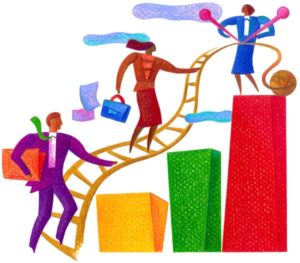Honoring Mistakes
By Larry Wilson, Author of Play to Win, Excerpt from the book, Cracking the Business Code
How do people’s mistakes play out in the world of work, and what has this to do with leadership? A number of years ago I found myself following the speech of the then CEO of AT&T. His speech to his top 500 leaders focused on a single message, “Do it right the first time.”
 His forceful words never allowed for any exceptions to his mantra that “Do it right the first time” perfection was the only outcome any leader should expect; from themselves or from the folks they were leading.
His forceful words never allowed for any exceptions to his mantra that “Do it right the first time” perfection was the only outcome any leader should expect; from themselves or from the folks they were leading.
As he left the podium (having received nothing close to a standing ovation or even a slightly warm crowd response), it was then my turn to face this confused, unenthusiastic and potentially hostile audience.
So, I took a risk. First, I acknowledged the CEO’s passion for wanting people to perform at their best, and then tried to do my best to reduce the communication confusion by saying, “Of course, he meant after you’ve learned to do something perfectly, then for certain continue to do it perfectly every time. It goes without saying no one can do anything perfectly the first time they try something they’ve never done before.”
It may have only been a coincidence that I was never asked to speak again at AT&T, or you might say that I had made a big mistake by trying to “clear up” the CEO’s message.
But this is not about me. I know about the many mistakes I’ve made. Our subject is about valuing, actually honoring, mistakes as the best and fastest way for anyone to learn anything. This message is particularly essential to those in a leader role.
The fact is everyone is in a leadership role, minimally, as each of us has the role and responsibility of leading our lives to achieve the best life that is possible. How well we’re able to lead our life is surely the best predictor of how effective we’ll be in leading others to do the same.
Here’s the gist of this honoring mistakes subject: People who lead the best possible lives are those people who have made the most and varied types of mistakes, and learned fastest from those mistakes.
I co-authored a book with my oldest son, Hersch entitled, Play to Win, Choosing Growth Over Fear in Work and in Life. We defined the opportunity to choose between two opposite responses to the things life brings to us. One primary response we call Play to Win. The other, and most opposite, we call Playing Not to Lose.
We defined Play to Win as: Going as far as I can with all that I’ve got, and learning from whatever happens. This response is saying, “I’m seeking a life of growth, adventure, joy, and to make a difference in my world. I’m willing to step out and take reasonable risks to lead my greatest life.”
We define Playing Not to Lose as: Avoiding anything or anyone that might in any way hurt, embarrass, or make us uncomfortable. This response is saying, “I’m staying in my comfort zone by avoiding the risks of being wrong, rejected, failing, or being emotionally upset. I’m seeking a secure life of basic survival, comfort, and relief. I don’t make many mistakes but at least I’m safe.”
at least I’m safe.”
Which of these opposite attitudes has the best chance of someone leading their best life, meaning a life with more successes and more fulfillments? Which attitude would make the best leader others would be more willing to follow? Which attitude would make the best followers for any leader?
The answers to those questions are clearly obvious – if – we’re willing to be obviously objective.
And if it’s all this obvious, you may be asking what stops leaders from willingly choosing growth over fear by Playing to Win? Glad you asked!
The answer is in the question; they have already chosen fear over growth.
And what is it that’s their greatest fear? More often than not, they’re more fearful of what it is they have to lose, rather than what it is they have to win. The fact is this is a choice most of us learned, and have forgotten, while being conditioned to avoid risks in our early childhood, a process sometimes called “no, no” training.
So this brings us to the core of today’s subject. It’s the fear of making mistakes, and the high cost of not making them.
The fact is that businesses can no longer afford the high cost of people doing only what their told to do. We firmly believe that people who are only doing their job are not doing their job. In today’s changing world, it is everyone’s job to continuously improve their job, (think Toyota), starting with leaders, because leaders go first. This is leadership.
The first change that leaders have to make is a “mindset change” from commanding people to “do what your told” to asking people to “do what’s right.” The old control and command fear based system of leadership has to be replaced by a new trust-based “Developmental Leader” system. A Developmental Leader passionately believes that people are the organization’s competitive advantage and ultimate differentiation.
Therefore, this new leadership style is asking their people to bring all of their unique talents, creativity, commitment, and potential to their work. Let’s use an example. Developmental leaders understand that the people closest to their job have the best opportunity to improve their job. This is where making mistakes comes into play.
In this scenario of asking people to improve their job, we’re asking people to do, or try to do, something that they haven’t done before. Yet we can’t expect them to “do it right the first time”. Here is a fact of life. The only thing anyone can do right the first time is to make a mistake! Yet, as a conditioned fallible human being, we fear making a mistake because it’s a “no, no” and has almost always had a real or perceived negative consequence.
 It’s the leader’s job to change that thinking so they can support their followers to do the same. Try this for size. The best way to validate the necessity of making mistakes is to celebrate those mistakes. Go back to the Play to Win attitude and remember the part that said, “I’m willing to step out and take reasonable risks to lead my greatest life”.
It’s the leader’s job to change that thinking so they can support their followers to do the same. Try this for size. The best way to validate the necessity of making mistakes is to celebrate those mistakes. Go back to the Play to Win attitude and remember the part that said, “I’m willing to step out and take reasonable risks to lead my greatest life”.
As a leader that goes first, take the reasonable risk of sharing your mistakes, and what you learned from them, in a way that teaches others that learning something new or different requires a number of “takes” before you get it right.
As a leader, create a positive culture that sends a message that you as a leader trust them, and that you trust each of them to bring their best self to the party of life every day. Remind them that we’re all fallible human beings that will always make mistakes. Yet we can all be winners if we learn from those mistakes and especially if we’re courageous enough to share with each other what we’ve learned.
As a leader in a changing world, let your mantra be heard: Fail fast, learn fast, and grow fast.
Permission is needed from Lighthouse Consulting Services, LLC to reproduce any portion provided in this article. © 2015 This information contained in this article is not meant to be a substitute for professional counseling.
Larry Wilson was an internationally recognized pioneer in change management, leadership development and strategic thinking, and is the co-author of The One-Minute Sales Person and Play to Win. He founded two companies, Wilson Learning Corp. and Pecos River Learning. Larry worked with companies to help them “create the organization that, if it existed, would put them out of business.” Larry passed on in 2009 and will be greatly missed, yet cherished through his books and articles for years to come. One of the things that Larry used to say was “Love your customers so much that they want to refer business to you since who can resist love?”
If you would like additional information on this topic or others, please contact your Human Resources department or Lighthouse Consulting Services LLC, 3130 Wilshire Blvd., Suite 550, Santa Monica, CA 90403, (310) 453-6556, dana@lighthouseconsulting.com & our website: www.lighthouseconsulting.com.
Lighthouse Consulting Services, LLC provides a variety of services, including in-depth work style assessments for new hires & staff development, team building, interpersonal & communication training, career guidance & transition, conflict management, 360s, workshops, and executive & employee coaching. Other areas of expertise: Executive on boarding for success, leadership training for the 21st century, exploring global options for expanding your business, sales and customer service training and operational productivity improvement.
To order the books, “Cracking the Personality Code” and “Cracking the Business Code” please go to www.lighthouseconsulting.com.
We recently launched a new service called Sino-Am Leadership to help executives excel when stationed outside their home country. American managers in Asia and Asian managers in America face considerable business, personal, and leadership challenges because of the cultural differences. This unique program provides personal, one-on-one coaching. For more information visit, https://lighthouseconsulting.com/performance-management/talent-development/sino-american-management-style/.





